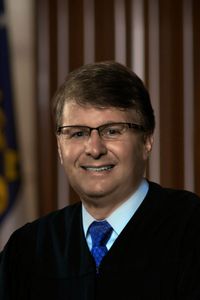Mark Martin (North Carolina)
Mark Dean Martin was a justice on the North Carolina Supreme Court from 1999 to 2019. He served as chief justice from 2014 to 2019.
Martin was first elected to the court in 1998. On August 18, 2014, Governor Pat McCrory (R) appointed Martin to the office of chief justice to replace Chief Justice Sarah Parker. Martin assumed the office of chief justice on September 1, 2014.[1][2][3]
Prior to serving on the North Carolina Supreme Court, Martin was a judge on the North Carolina Court of Appeals from 1994 to 1999 and a judge for the North Carolina 3A Judicial District from 1992 to 1994. He received his J.D. from the University of North Carolina School of Law. As of 2018, Martin was a Republican.[4]
Martin stepped down on February 28, 2019, to become the dean of Regent University Law School in Virginia Beach, Virginia.[5] To learn more about this vacancy, click here.
Education
Martin received his undergraduate degree from Western Carolina University, summa cum laude, in 1985 and his J.D., with honors, from the University of North Carolina School of Law in 1988. He later graduated from the National Judicial College in the general jurisdiction course and in 1998 earned his LL.M. in judicial process from the University of Virginia School of Law.[3][6]
Career
In 1998, Martin was elected to the North Carolina Supreme Court at thirty-five years of age, making him, at that time, the youngest supreme court justice in North Carolina history.[3] In February 2006, Martin was appointed a senior associate justice of the supreme court and, later that year, was re-elected to an eight-year term. Martin was re-elected in 2014 to serve an eight-year term as chief justice.
Martin served on the North Carolina Court of Appeals from 1994 to 1999. He was a judge in the North Carolina 3A Judicial District from 1992 to 1994. Prior to that, he was legal counsel to Governor James G. Martin (no relation). Martin also worked as an attorney in the private sector and taught law at Duke University School of Law, the North Carolina Central University School of Law, and the University of North Carolina School of Law.[6]
After graduating from law school, Martin served as a law clerk for Judge Clyde Hamilton on the United States Court of Appeals for the 4th Circuit.[6]
Elections
2014
Martin stood for and won re-election to the supreme court.
Political ideology
In October 2012, political science professors Adam Bonica and Michael Woodruff of Stanford University attempted to determine the partisan ideology of state supreme court justices. They created a scoring system in which a score above 0 indicated a more conservative-leaning ideology, while scores below 0 were more liberal.
Martin received a campaign finance score of 0.16, indicating a conservative ideological leaning. This was more conservative than the average score of -0.01 that justices received in North Carolina.
The study was based on data from campaign contributions by the judges themselves, the partisan leaning of those who contributed to the judges' campaigns, or, in the absence of elections, the ideology of the appointing body (governor or legislature). This study was not a definitive label of a justice, but an academic summary of various relevant factors.[7]
Endorsements and Scorecards
During the 2014 cycle, Martin was endorsed by the following organizations:
- North Carolina Police Benevolent Association[8]
- North Carolina Medical Association.[9]
- North Carolina AFL-CIO[10]
- North Carolina Republican Party[11]
See also
External links
- Search Google News for this topic
- 2014 Campaign website
- 2014 Campaign Facebook profile
- Project Vote Smart biography
- North Carolina Supreme Court
Footnotes
- ↑ Governor Pat McCrory, "Governor Will Appoint Justice Mark Martin as Chief Justice of the State Supreme Court," August 18, 2014
- ↑ News Observer.com, "McCrory appoints Mark Martin chief justice of NC Supreme Court," August 18, 2014
- ↑ 3.0 3.1 3.2 Project Vote Smart, "Senior Associate Justice Mark D. Martin (NC)," accessed August 19, 2014
- ↑ Carolina Journal, "N.C. Supreme Court race taking a liberal turn," October 10, 2018
- ↑ Greenville Daily Reflector, "North Carolina chief justice to resign for law school post," January 25, 2019
- ↑ 6.0 6.1 6.2 North Carolina Judicial Branch, "Mark Martin," accessed January 30, 2019
- ↑ Stanford University, "State Supreme Court Ideology and 'New Style' Judicial Campaigns," October 31, 2012
- ↑ NCPBA, "NCPBA court endorsements," accessed July 9, 2016
- ↑ North Carolina Medical Association, "See Who the NCMS PAC Endorsed for NC Judicial Seats," accessed July 9, 2016
- ↑ AFL-CIO NC, "We Endorse Kay Hagan for U.S. Senate, Mark Martin for Chief Justice," accessed July 9, 2016
- ↑ NC GOP, "NC Republican Party Statement on Endorsements of Judicial Candidates," accessed July 9, 2016
Federal courts:
Fourth Circuit Court of Appeals • U.S. District Court: Eastern District of North Carolina, Middle District of North Carolina, Western District of North Carolina • U.S. Bankruptcy Court: Eastern District of North Carolina, Middle District of North Carolina, Western District of North Carolina
State courts:
Supreme Court of North Carolina • North Carolina Court of Appeals • North Carolina Superior Courts • North Carolina District Courts
State resources:
Courts in North Carolina • North Carolina judicial elections • Judicial selection in North Carolina








